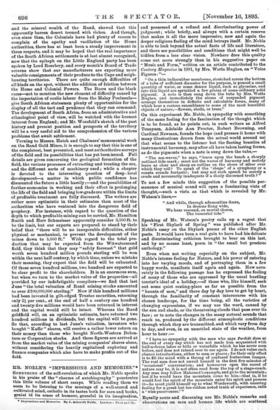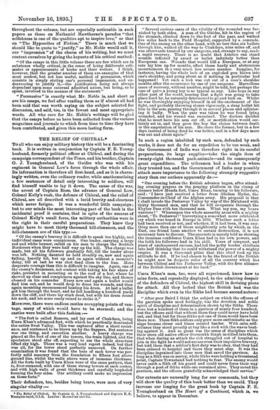MR. NOBLE'S "IMPRESSIONS AND MEMORIES."
SOMETHING of the self-revelation of which Mr. Noble speaks in his praise of the "charms of autobiography" penetrates this little volume of short essays. While reading them we seem to be listening to the musings of a well-stored and cultivated mind, catholic in its tastes both for men and books, genial in its sense of humour, graceful in its imagination,
• Impressions and Memories. By J. Ashcroft Noble. Lordun Derlt and Co.
and possessed of a refined and discriminating power of judgment ; while briefly, and always with a certain reserve that makes it all the more impressive, now and again the deeper religions feeling of the mind betrays itself. Mr. Noble is able to look beyond the actual facts of life and literature, and there see possibilities and conditions that might well be hidden from a less clear vision. Nowhere does this quality
come out more strongly than in his suggestive paper on "Music and Form," written on an article contributed to the Century _Magazine in 1891, by Mrs. Watts Hughes, on "Voice Figures: "On " On a thin indiarnbber membrane, stretched across the bottom of a tube of sufficient diameter for the purpose, is poured a small quantity of water, or some denser liquid, such as glycerine, and into this liquid are sprinkled a few grains of some ordinary solid pigment. A note is then sung down the tube by Mrs. Watts Hughes, and immediately the atoms of suspended pigment arrange themselves in definite and calculable forms, many of which bear a curious resemblance to some of the most beautiful objects of nature,—flowers, shells, or trees."
On this experiment Mr. Noble, in sympathy with something of the same feeling for the fascination of the thought which is to be found, as he points out, in such writers as Alfred Tennyson, Adelaide Ann Proctor, Robert Browning, and Cardinal Newman, founds the hope (and presses it home with many illustrations drawn from the actual world around us) that what seems to the listener but the fleeting beauties of instrumental harmony, may after all have taken lasting forms, as do the pigments when a note is sung down the tube,—
" The sea-waves," he says, 'leave upon the beach a sharply outlined tide-mark ; must not the waves of harmony and melody leave as clear and sharp an outline on the shore of ether over which they roll ? To speak of the shape' of a. symphony or a sonata sounds fantastic; but may not such speech be merely a crude and necessarily inadequate if a dimly discerned truth ? "
To not a few minds this suggestion of the possible per- manence of musical sound will open a fascinating vista of thought,—such a vista as that which is revealed by Mr. Watson's lines,—
" And while, through adamantine doors, In dreams flung wide,
We hear resound, on mortal shores, The immortal tide."
Speaking of Mr. Watson's poetry calls up a regret that his "First Skylark of Spring" was published after Mr. Noble's essay on the Skylark poems of the other English poets. It would have been a real gain to have had his delicate and discriminating criticism brought to bear on this last, and by no means least, poem in "the small but precious anthology."
Even when not writing especially on the subject, Mr.
Noble's intense feeling for Nature, and his power of entering into her varying moods, and of portraying them in a few happy words, manifests itself again and again. How accu- rately in the following passage has he expressed the feeling of many of those who are oppressed by the usual bustling tourist's ideal of a holiday,—of those who, like himself, seek out some quiet resting-place as far as possible from the "haunts of men," and there day by day love to get by heart, through the familiarity of constant intercourse with his chosen landscape, for the time being, all the varieties of changing expressions, if we may use the word, caused by the sun and shade, or the threatening clouds that pass over its face ; or to note the changes in the many natural sounds that reach us, produced by the different atmospheric conditions through which they are transmitted, and which vary from day to day, and even, in an unsettled state of the weather, from hour to hour :—
" I have no sympathy with the man who says Perdidi diem at the end of every day which has not made him acquainted with half-a-dozen lakes or bills or waterfalls which he has never seen before, and does not intend ever to see again. I do not value such chance introductions, either to men or places ; for their only effect is to fill the mind with a throng of confused featureless images. The real man does not unveil himself in the first five minutes of 'occasional' conversation; and howsoever open the secret of nature may be, it is not often read from the top of a stage-coach. Any man may follow Mahomet's example, and go to the mountain; but if he would have the mountain come to him—that is, if he would feel the spirit of the mountain enter his spirit and possess it—he must yield himself up to what Wordsworth, with unerring feeling for a great but too seldom noted truth of experience, calls a wise passiveness."
Equally acute and discerning are Mr. Noble's remarks and observations on men and human life which are scattered throughout the volume, but are especially noticeable in such papers as those on Nathaniel Hawthorne's paradox "that selfishness is one of the qualities apt to inspire love," or that on "The Hypocrites of Fiction." There is much that we should like to quote to "justify," as Mr. Noble would call it, our " impression " of the charm of his writing, but we must content ourselves by giving the keynote of his critical method :
"Of the essays in this little volume there are few which are in substance wholly critical, in the sense of being deliberate esti- mates or appraisements of books and their writers. I think, however, that the greater number of them are examples of that most modest, but not less useful, method of persuasion, which consists in simply stating one's personal impression, and en- deavouring to justify it,—the justification being not always dependent upon some external admitted axiom, but being, so to speak, involved in the manner of the statement."
"Persuasive" is exactly what Mr. Noble is, and short as are his essays, we feel after reading them as if almost all had been said that was worth saying on the subject selected for discussion, and said, too, in the fewest and most appropriate words. All who care for Mr. Noble's writings will be glad that the essays before us have been collected from the various magazines and journals to which from time to time they have been contributed, and given this more lasting form.



















































 Previous page
Previous page